Making the EUROPARC Youth Manifesto a reality at Yorkshire Dales National Park
Youth Forum Malham
The EUROPARC Youth Manifesto is a source of ideas and inspiration for decision-makers in Protected Areas and rural communities to ensure the involvement and empowerment of young people. Yorkshire Dales National Park in the UK has worked hard over the past few years to make the manifesto a reality. Katy Foxford is the Tourism Support Officer at the Park and was heavily involved in the implementation. She has written an article on her experiences:
Article issued by Katy Foxford
Why it matters
Over the past few years working for the Yorkshire Dales National Park, I have come to realise the importance of involving young people in the governance of protected and rural areas, both from a personal and also a much wider standpoint. Involving youth has benefits not only for the young people involved, but also for the organisation and in turn the communities around them. These benefits can include:
- better informed planning and decision making;
- building of mutual respect, understanding and social cohesion;
- increased knowledge of community issues and cultures;
- greater social awareness and sense of responsibility;
- increased care for the local environment;
- passing on of traditions and knowledge.
EUROPARC Youth Manifesto
In 2018 my colleague and I, alongside 50 other delegates from across Europe, attended the first Cairngorms workshop to help create the EUROPARC Youth Manifesto. This was subsequently launched at the EUROPARC Conference in September 2018. The manifesto is a call for change. It is a source of ideas and inspiration for decision makers in protected areas and rural communities to ensure the involvement and empowerment of young people, with the aim to create a vibrant future for them, for nature, and for our rural areas.
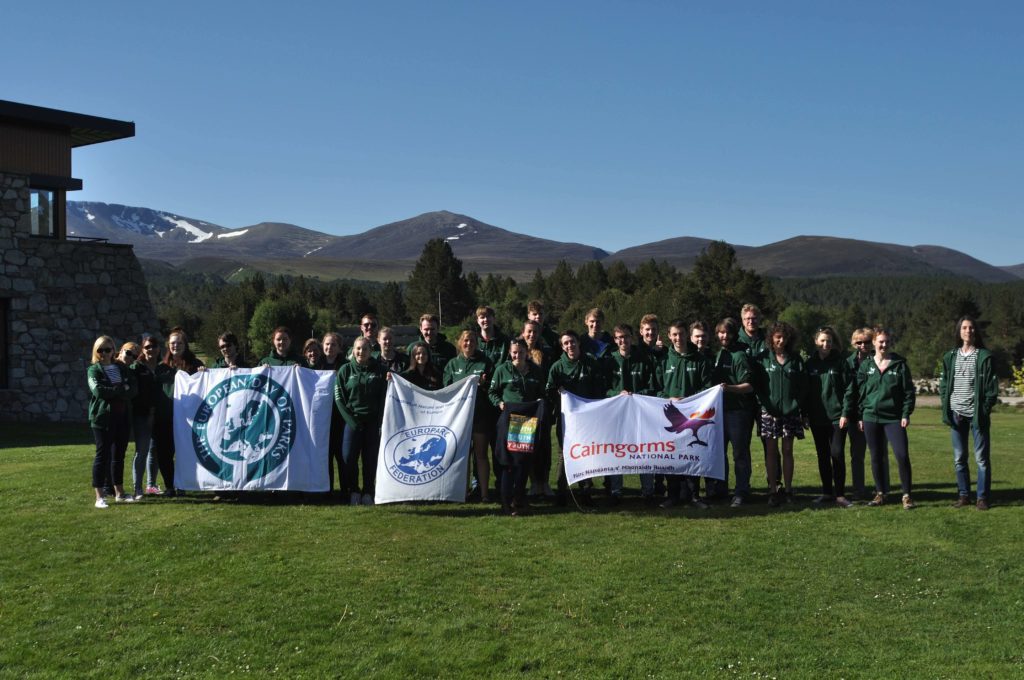
Cairngorms, EUROPARC Conference, September 2018
The Youth Manifesto is particularly pertinent to the Yorkshire Dales. The Yorkshire Dales are facing real problems with regard to retaining and attracting young people and it is recognised that the Youth Manifesto can play an important role in tackling this.
Almost 60% of the total Dales population are aged 45 and over; this compares with only around 40% nationally. Young people have left rural areas such as the Dales in large numbers, whilst older, retired people have moved into the area. The YDNPA Authority has worked to create awareness of the Manifesto and taken action to incorporate elements of the Youth Manifesto into its work.
Integration and awareness
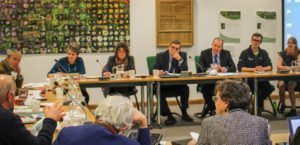
At the top table – apprentices Ian Colledge and Katy Foxford, furthest right, take questions from Members on the Youth Manifesto
Firstly, we looked at how we could apply the Youth Manifesto to the work of the Authority and the actions of the National Park Management Plan. The 27 action areas of the Manifesto were scrutinised and department heads were asked to consider how they might apply the Manifesto to their particular area of work.
A formal approach was taken to implementing the Youth Manifesto by asking Authority members to vote on the paper at the National Park Authority Meeting. Members voted unanimously to adopt the EUROPARC Youth Manifesto and to give detailed consideration, over the next few months, to the 27 actions in it.
In order to create awareness of the Manifesto, presentations have been made to staff, at national conferences and international seminars and blogs have also helped to maintain a high profile for the Manifesto.
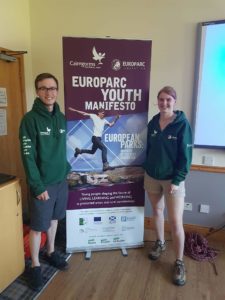
Youth Manifesto, Cairngorms NP
Practical action
Practical action was taken in the form of setting up an internal Youth Forum for apprentices and under 30’s in the Authority. The aim was to create a space for the younger people to meet up and connect, have fun, learn a new skill, find out about a different department, explore a different area of the National Park, and broaden the experience of an apprentice to ensure transferable skills can be gained in different areas, so that they are in a better position to gain employment once the apprenticeship comes to an end. These objectives stem from the action areas of the Youth Manifesto, such as giving young people a voice and a chance to make decisions.
Consultation and decision making
Making positive change for young people, and engaging them in consultation processes is important, which is why the Authority has created videos and used social media to target young people in the area, including schools, to get their views on the issues surrounding the National Park, from climate change to employment to the future sustainability of the Park, and to have their say and be involved with the consultation.
Young people should be an integral part of governance and decision-making and able to influence agendas and policies, rather than merely being consulted. The YDNPA has taken a step to give two young people seats as youth representatives at the National Park Management Plan steering group.
Research is being done into identifying and recruiting young people from relevant and varied backgrounds to act as ambassadors, in order to help engage more young adults from demographic groups that are currently under-represented.
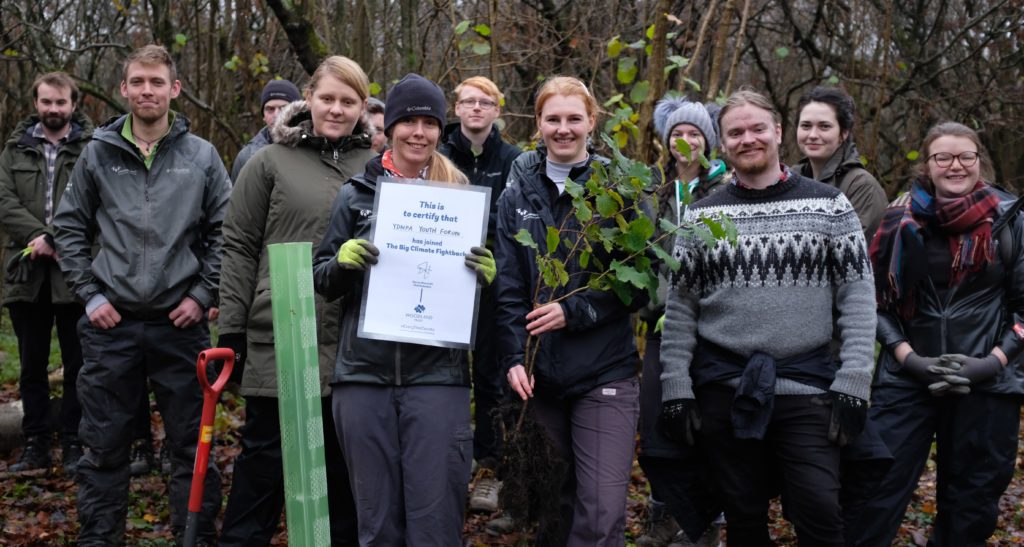
YDNPA Youth Forum Certificate – joining The Big Climate Fightback
Collaboration and initiatives
Prior to the Youth Manifesto, the Authority had launched an ‘Attracting Young People’ initiative, in conjunction with district councils, which includes a range of practical steps to try to reverse the trend of young people and families migrating away from the rural areas; the Youth Manifesto adopted by the Authority feeds into this initiative.
The initiative includes measures to:
- build more affordable housing (including community-led and self-build housing);
- improve digital communications;
- create better jobs;
- retain and strengthen local services;
- promote the area as a place to live.
The YDNPA commissioned a Social, Economic and Housing Study of the Park, which showed the need for affordable housing but also the need to create more one and two-bed accommodation, which suits the younger generation but also suits the older generation who want to downsize.
The Lakes and Dales region has 44% fewer 16-34-year old than the national average, which raises significant concerns regarding its future economic and community resilience. The ‘Great Place: Lakes and Dales’ project aims to tackle this problem with various initiatives; this has included holding a flexible housing design competition to attract architects from around the world who could bring new innovative thinking to flexible housing which will appeal to young people and draw them to the area.
Education
As well as the housing problem, there is a lack of awareness about opportunities available to young people in rural areas, which is why it is important to involve young people from an earlier age and help them to feel a valued part of the community. Many won’t know about the opportunities available to them, which is why it is important to get these messages into schools and make young people aware about the work in the countryside and how they can be involved in conservation.
The ‘Great Place: Lakes and Dales’ project has created videos of young people who work for the Authority showing them speaking about their work. These videos are designed for use by schools and at careers fairs with the aim of making these ‘hidden jobs’ more visible as they may not be well advertised or seen to be an option. The Authority also caters for work placements, internships, externships and apprenticeships – the latter being how I first became employed at the Yorkshire Dales National Park.
Work is ongoing with primary and secondary schools to engage young people with the National Park. Reaching this demographic is crucial to young people developing a relationship with nature and the outdoors, as well as for their life skills, enjoyment of the countryside and personal health and well-being.
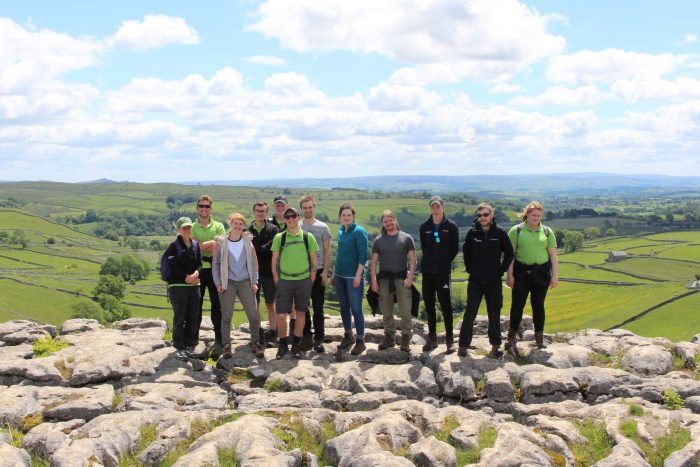
Youth Forum Malham
Additional projects
- Generation Green
One of the latest youth-related projects that the YDNPA is involved in. The scheme will deliver activities and experiences in the outdoors for young people (aged 8 to 24) to connect young people to nature, and support them to develop skills to enhance nature recovery, including volunteering and employment opportunities.
- Volunteering activity
This year YDNPA is recruiting 10 youth volunteers, funded by Generation Green. This programme of volunteering activity is being piloted for young people for ‘training/up-skilling’ related to a broad suite of National Park activities. These roles will be varied and targeted to young people, for example, we have a photographer willing to train and mentor a volunteer.
- Young Rangers
A volunteering activity, based on the EUROPARC Junior Ranger Programme. It gives opportunities to young people aged 11 to 16 years, from all backgrounds, to learn about the National Park and to take part in practical activities. It also contributes towards the Duke of Edinburgh and John Muir Awards and can lead directly to ranger apprenticeships.
The way forward
I believe organisations have to be open and proactive in involving young people in the work that they do.
Funding is limited but it can be about making small changes, learning from others and being creative. There are many things that can be done to encourage the retention of young people living in the countryside and to attract more young people to move here, but these all come with their own challenges:
- job creation strategies and programmes,
- education,
- skills development and technical training,
- youth involvement in the community,
- financial incentives to live and work in the area.
It is important to look at what is already being achieved locally in the area and just select one aspect where a difference might be made – for example making places easier to go to and creating spaces for young people to connect. It is a starting point to involve young people in the work and the decisions to be taken.
A good idea is to seek out young people and find those who want to talk about local issues. Reaching out is the first step – identify the young people and think about how it is possible to achieve this. This can be done through youth bodies already in place, such as youth forums and councils. Use social media to target younger demographics and create campaigns to promote a clear programme of opportunities. Start a dialogue, such as: Why are you here? What could be done better? How can you be involved?
Bringing about these changes relies on partnerships and collaborative working, and that is why it is so important to seek to influence and gain the support of local and national government bodies. It is still early days, but there is a lot of planning and ambition within the Authority to tackle this issue, and hopefully, we will see the positive results of this in the future.
I hope this provides some inspiration on where to start and remember the Youth Manifesto is a really useful tool to help bring about change for young people in rural areas.
